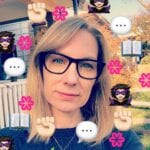Hi friends, it’s Rachel Giese, Xtra’s editorial director. Summer has finally arrived, and it’s drawing me and my fellow Torontonians outside into the sticky heat, as the city begins to (slowly) lift its lockdown.

With my extrovert FOMO in overdrive, I can’t wait to see all the friends and family I missed over the winter—even if it’s two metres apart across a picnic blanket. Before you head for your (vaccinated, safely distanced or virtual) weekend gatherings, get caught up on all your conversation starters with our newsletter. And remember, “Topline” is just a sampling—subscribe to Xtra Weekly to get the full newsletter, and all the latest politics and culture LGBTQ2S+ news from around the world.
What’s the buzz 🐝?
Warning: The story below contains mention of abuse and violence against Indigenous people. For those in crisis, the National Indian Residential School Crisis Hotline can be reached at 1-866-925-4419.
At the end of May, the remains of 215 children, some as young as three, were found buried on the grounds of a former residential school in Kamloops, British Columbia. It’s believed these deaths were unrecorded, as were thousands of others over the course of more than a century. Over 150,000 Indigenous children were forcibly detained in these institutions and neglected, starved and abused.
Chief Rosanne Casimir of the Tk’emlúps te Secwe̓pemc First Nation called the discovery an “unthinkable loss that was spoken about but never documented at the Kamloops Indian Residential School.” Thousands more missing Indigenous children are believed to be buried in unmarked graves throughout Canada.
Vigils, drum and prayer circles and demonstrations were held across Turtle Island. Memorials were created using children’s shoes and stuffed animals. Communities gathered in orange shirts to commemorate survivors and to renew their cries for the Canadian government to take immediate and concrete action on the recommendations of the 2015 Truth and Reconciliation Commission report.
In the Globe and Mail, Anishinaabe journalist Tanya Talaga wrote, “It is time to find our children. Show them they are not forgotten. That they mattered and are loved.”
What were we thinking 🧡?
The Indian Residential School system was one of many weapons used by colonizing forces in an attempt to eradicate Indigenous languages and cultural practices and tear families apart. Another weapon of genocide was the attack by Christian churches on Indigenous sexualities and gender identities.
Prior to colonization, many Indigenous cultures embraced fluid or non-binary gender identities, non-hetero forms of love and sexuality and non-patriarchial, non-nuclear family units. (Indigenous identities such as Two-Spirit are often used interchangeably with “gay” or “trans,” but they have distinct and specific cultural and historial meanings.) Christian colonizers aimed to repress and control these identities and traditions through religious conversion and laws that criminalized certain kinds of sex and family configurations.
With that in mind, it feels especially meaningful that June marks both Pride Month and National Indigenous History Month—a time to honour the perseverance of love and community, to fight for justice and to both highlight and reckon with history.
It’s also a time to celebrate thriving futures, as Jeremy Dutcher, the acclaimed Two-Spirit composer and musician from Tobique First Nation, reminded me with a recent tweet:
This year, it seems more powerful than ever to honour some of the Two-Spirit and Indigenous LGBTQ+ artists and creators whose work is building new and brilliant futures.
Arielle Twist is a Nehiyaw, Two-Spirit trans poet and multidisciplinary artist. Here she is talking to Xtra about her inspirations.
Navajo drag artist Lady Shug is a force of nature—and one of the breakout stars of the drag makeover series We’re Here. She’s an activist for Indigenous rights, as well as mentor to other Indigenous performers.
Award-winning novelist and editor Joshua Whitehead is a Two-Spirit, Oji-nêhiyaw member of Peguis First Nation. His recent speculative fiction anthology Love After The End won a 2021 Lambda Literary prize.
Anishinaabe composer and musician Melody McKiver, who was recently profiled on the APTN series Amplify, weaves together influences that include Anishinaabe ceremonial songs and European classical music.
Husbands Adrian Matthias Stevens (Northern Ute, Shoshone-Bannock and San Carlos Apache) and Sean Snyder (Navajo and Southern Ute) are powwow dancers bringing Two-Spirit representation to events where same-sex partnerships are not yet common. They’ve been profiled in Vogue and celebrated in the short documentary, Sweetheart Dancers.
Kanienʼkehá꞉ka actress Kawennáhere Devery Jacobs, known for roles in American Gods and Rhymes for Young Ghouls, is one of the stars of the upcoming TV series Reservation Dogs, created by Sterlin Harjo and Taika Waititi. Here, she’s talking to Xtra about race, sexuality and representation in front of and behind the camera.
In other Xtra news 🌎
👉“So many people assume that queer parenting is radically different than straight parenting and we really put forward the idea that it is—and that that’s a good thing.” Trystan Reese discusses his experiences with the adoption process and being a trans parent in his debut book.
👉TikTokers are hilariously skewering corporate Pride, and in this week’s “TikTalk” column, Xtra’s Mel Woods highlights the creators calling out company nonsense.
👉On the 20th anniversary of Legally Blonde, Andi Schwartz celebrates how the film went far beyond the “girl power” platitudes of its era. “Bend and snap” your way to heroic femmedom in our latest “Queer View Mirror.”
👉Grammy award-winning icon of lesbianism k.d. lang dropped their latest album last week, aptly titled Makeover, which brings together various remixes of lang’s most popular songs of the 1990s—as well as a few deep cuts—for the first time. We look back at five iconic moments from their career.
👉The process and finances of assisted reproduction can be overwhelming for single queer people, and Ken McNeilly wants the definition of “patient” to include surrogates, egg donors and sperm donors in Canada. Xtra contributor Alison Motluk explains.
👉Want more headlines? Subscribe to Xtra Weekly.
Watch this
This week the final word goes to Ma-Nee Chacaby, a Two-Spirit Ojibwe-Cree writer, artist, mentor and activist.


 Why you can trust Xtra
Why you can trust Xtra


